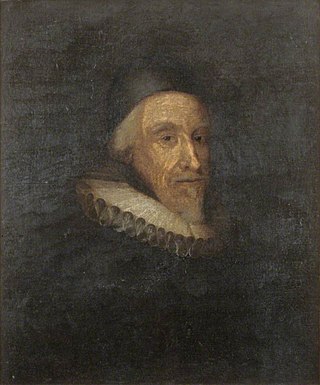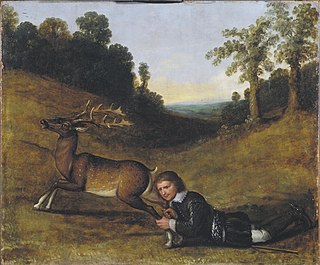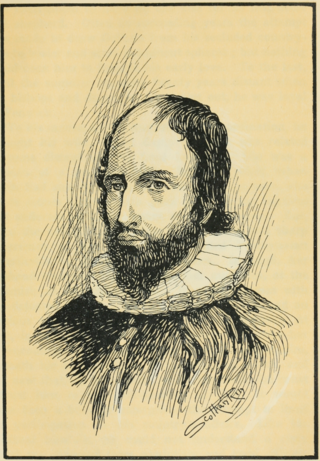
Andrew Cant (1584–1663) was a Presbyterian minister and leader of the Scottish Covenanters. About 1623 the people of Edinburgh called him to be their minister, but he was rejected by James I. Ten years later he was minister of Pitsligo in Aberdeenshire, a charge which he left in 1638 for that of Newbattle in Midlothian. In July of that year he went with other commissioners to Aberdeen in the vain attempt to induce the university and the presbytery of that city to subscribe the National Covenant, and in the following November sat in the general assembly at Glasgow which abolished episcopacy in Scotland. In 1638 Cant was minister of Pitsligo in Aberdeenshire. In 1640 he was chaplain to the Scottish army and then settled as minister in Aberdeen. Though a staunch Covenanter, he was a zealous Royalist, preaching before Charles I in Edinburgh, and stoutly advocating the restoration of the monarchy in the time of the Commonwealth. Cant's frequent and bitter verbal attacks on various members of his congregation led in 1661 to complaints laid before the magistrates, in consequence of which he resigned his charge.

John Nisbet (1627–1685) was a Scottish covenanter who was executed for participating in the insurgency at Bothwell Brig and earlier conflicts and for attending a conventicle. He took an active and prominent part in the struggles, of the Covenanters for civil and religious liberty. He was wounded and left for dead at Pentland in 1666 but lived and fought as a captain at Bothwell Bridge, in 1679. He was subsequently seized and executed as a rebel. He was a descendant of Murdoch Nisbet, a Lollard who translated the Bible into the Scots language.

Alexander Shields or Sheilds or Sheills was a Scottish, Presbyterian, nonconformist minister, activist, and author. He was imprisoned in London, in Edinburgh and on the Bass Rock for holding private worship services. After his escape from prison he wrote A Hind Let Loose which amongst other things argues for the rights of people to resist tyrants including the bearing of arms and the resistance of taxes. It even argues that assassination, in extreme cases, is sometimes justified. Shields was one of the ministers who supported the Cameronians who disowned the king. They were brutally put down. All three of the Cameronian field-preachers, of which Shields was one, rejoined the church after the Revolution. Shields served as a chaplain to King William's armies in the Low Countries. Shields was later called to be a minister at St Andrews but did not stay there long as he joined the second Darien Expedition. After its failure he died on Jamaica under 40 years of age.

William Guthrie (1620–1665) was a Scottish Covenanter minister and author. He was the first minister of Fenwick parish church in Ayrshire, Scotland. He is known primarily for his book on assurance, The Christian's Great Interest.

John Blackadder (1615–1685) was an eminent Presbyterian Covenanter preacher in Scotland during the period of the Commonwealth of England (1649–1660). Of the times MacPherson said that "after the first rejoicings of the Restoration were over, the Covenanters — Resolutioners as well as Protesters — were speedily disillusioned, and it became evident that the aim of Charles II and the junta of self-seeking noblemen who were in control of the affairs of Scotland was to establish in Scotland something approximating to an oriental despotism. The Presbyterian system, in which an Assembly of ministers and elders controlled the affairs of the Kirk, had to be supplanted by an Episcopal, with a hierarchy controlled by the Crown and easily manipulated in the interests of tyrannical rule." Despite a government ban he continued to preach in the fields. He was arrested and imprisoned in 1681 and died in jail on the Bass Rock.
John Nevay was a Scottish Covenanter. He was the nephew of Andrew Cant, minister of Aberdeen. He graduated with an M.A. from King's College, Aberdeen, in 1626. He worked as tutor to George, Master of Ramsay. He was licensed by the Presbytery of Dalkeith 14 October 1630 on the recommendation of that of Alford, but left its bounds a fortnight after. He was admitted about 1637 and appointed in 1647 a member of committee to revise the Psalter. He was present at Mauchline Moor in opposition to the royal army in June 1648. He was subsequently pardoned by Parliament on 16 January 1649. Nevay was appointed a commissioner by Parliament for visiting the University of Aberdeen 31 July 1649. He was active in raising the western army in 1650, and in 1651 a prominent supporter of the Protesters. In 1654 he was named by the Council of England on a committee for authorising admissions to the ministry in the province of Glasgow and Ayr. On 23 December 1662 he was banished by the Privy Council from His Majesty's dominions and went to Holland, where he died in 1672, aged about 66.

Robert Dick of Prestonpans was a 17th-century merchant and inspector of salt works to Lord Carringtoune. He was arrested on 4 September 1676 for attending an open-air service in the Pentland Hills.

James Drummond was a seventeenth century Scottish covenanting field preacher. He was imprisoned on Bass Rock for around nine months. At the time of his incarceration his occupation was listed as chaplain to Margaret, Marchioness of Argyll.

Rev Thomas Hog of Kiltearn (1628–1692) was a controversial 17th century Scottish minister.
John Rae was an English parish minister.

James Fraser of Brea (1639–1699) was a Covenanter.

Alexander Dunbar was a Covenanting field preacher and school teacher. He was imprisoned on the Bass Rock for about a year between 1685 and 1686.

James Fithie was a chaplain at Trinity Hospital in Edinburgh. He was imprisoned on the Bass Rock for about a year between 1685 and 1686.

John Greig was a Presbyterian minister from Scotland.

Peter Kid was a 17th-century Presbyterian minister. He was possibly a native of Fife.
Thomas Ross of Nether Pitkerrie, was born about 1614. He was the son of George Ross of Nether Pitkerrie. He continued in Kincardine after the establishment of prelacy and owes his leaving to a meeting with John M'Gilligan.

John M'Gilligen was a 17th-century Presbyterian minister. He resisted the demands of the Episcopalian authorities and was imprisoned on the Bass Rock. His name is sometimes also spelled as John MacKilligen or John M'Killican or John MacKillican or even John M'Gilligine.
William Veitch. He was the youngest son of John Veitch, the minister of Roberton, Lanarkshire. He was educated at the University of Glasgow, graduating with an M.A. in 1659. He became a tutor in the family of Sir Andrew Ker of Greenhead. He was licensed to preach by the Presbytery of Lanark in 1664. Having identified himself with the Pentland Rising, he was outlawed, and escaped to Newcastle, where he became chaplain in the family of the Mayor. In 1671 he was ordained to a meeting-house at Fallowlees, a remote spot among the Simonside Hills, Rothbury. From that he removed to Hanamhall, in the same district, and afterwards to Seaton Hall, Longhorsly. Whilst living at the latter place under the assumed name of William [or George] Johnston, he was arrested on 16 January, and sentenced to the Bass Rock 22 February 1679.. Veitch was liberated on 17 July 1680, and returned to Newcastle. He aided Archibald, Earl of Argyll, in his escape from Scotland in 1681. In 1683 he went to Holland, and in 1685 he was again in Northumberland acting as an agent on behalf of Monmouth. Soon afterwards he was settled as minister of a meeting-house at Beverley, Yorkshire. Having returned to Scotland, he was called to Whitton Hall, Morebattle, April 1688. In 1690 he was minister of Peebles, and in September 1694, he was admitted to Dumfries. He demitted on 19 May 1715. His death was on 8 May 1722. In 1705 he presented to the church two communion cups.
Angus McBean, or as he was otherwise known by his family Æneas McBean was a Scottish minister and Covenanter. He was the last Presbyterian minister deposed under Episcopacy.

David Williamson was a Scottish minister and Covenanter who served as moderator of the General Assembly of the Church of Scotland in 1702. He is notable for his long association with Edinburgh's West Kirk, his seven marriages, and his portrayal in the traditional song "Dainty Davie".















